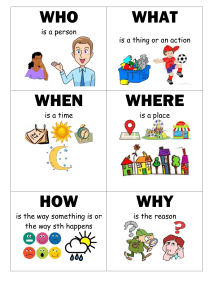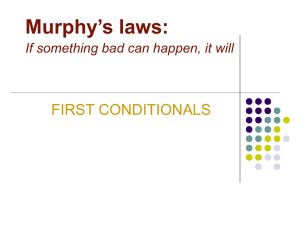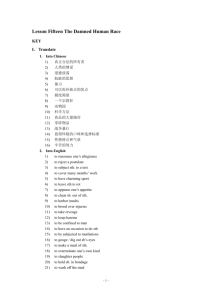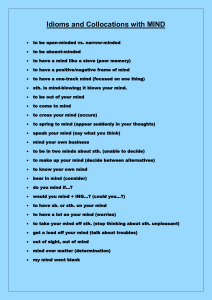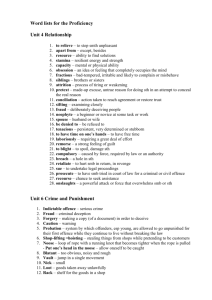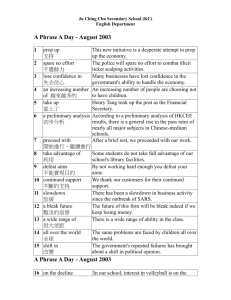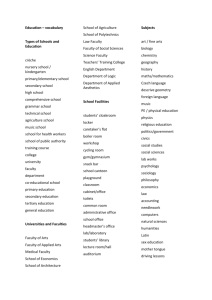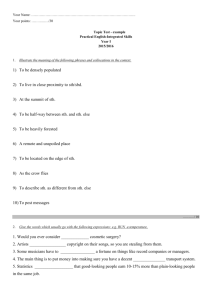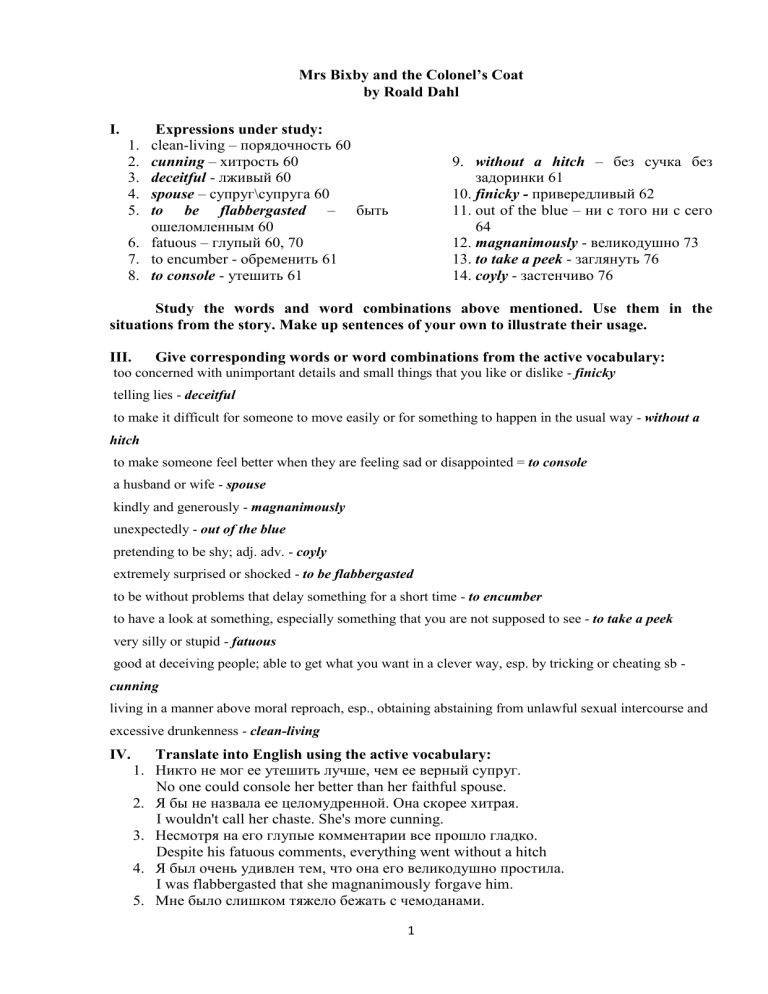
Mrs Bixby and the Colonel’s Coat by Roald Dahl I. Expressions under study: clean-living – порядочность 60 cunning – хитрость 60 deceitful - лживый 60 spouse – супруг\супруга 60 to be flabbergasted – быть ошеломленным 60 6. fatuous – глупый 60, 70 7. to encumber - обременить 61 8. to console - утешить 61 1. 2. 3. 4. 5. 9. without a hitch – без сучка без задоринки 61 10. finicky - привередливый 62 11. out of the blue – ни с того ни с сего 64 12. magnanimously - великодушно 73 13. to take a peek - заглянуть 76 14. coyly - застенчиво 76 Study the words and word combinations above mentioned. Use them in the situations from the story. Make up sentences of your own to illustrate their usage. III. Give corresponding words or word combinations from the active vocabulary: too concerned with unimportant details and small things that you like or dislike - finicky telling lies - deceitful to make it difficult for someone to move easily or for something to happen in the usual way - without a hitch to make someone feel better when they are feeling sad or disappointed = to console a husband or wife - spouse kindly and generously - magnanimously unexpectedly - out of the blue pretending to be shy; adj. adv. - coyly extremely surprised or shocked - to be flabbergasted to be without problems that delay something for a short time - to encumber to have a look at something, especially something that you are not supposed to see - to take a peek very silly or stupid - fatuous good at deceiving people; able to get what you want in a clever way, esp. by tricking or cheating sb cunning living in a manner above moral reproach, esp., obtaining abstaining from unlawful sexual intercourse and excessive drunkenness - clean-living IV. 1. 2. 3. 4. 5. Translate into English using the active vocabulary: Никто не мог ее утешить лучше, чем ее верный супруг. No one could console her better than her faithful spouse. Я бы не назвала ее целомудренной. Она скорее хитрая. I wouldn't call her chaste. She's more cunning. Несмотря на его глупые комментарии все прошло гладко. Despite his fatuous comments, everything went without a hitch Я был очень удивлен тем, что она его великодушно простила. I was flabbergasted that she magnanimously forgave him. Мне было слишком тяжело бежать с чемоданами. 1 To run with suitcases was encumbered to me 6. Она улыбнулась ему застенчиво. She smiled at him coyly. V. Find the English equivalents of: доходный мучить затягивать широко раскрытые глаза преждевременный пряжка распутный выкупать союз запястье козни, плутни снять телефонную трубку рогоносец протез восхитительный высокое давление чувственный снять крышку блоха помощь, обслуживание одуванчик хитрый, коварный, лукавый пломба суетиться запонки аккуратно сложить газету упасть в обморок поправить галстук вечный хлопнуть дверью полюбуйся! сморщенный шуршать глазницы отказать в удовольствии место работы сделать глубокий вдох и задержать дыхание VI. Transcribe the following words and pronounce them: subtle |ˈsʌtl| тонкий\утонченный rear |rɪə| задний fascinating |ˈfæsɪneɪtɪŋ| очаровательный prognathous |prɒɡˈneɪθəs| выдающийся masquerade |ˌmæskəˈreɪd| маскарад\притворство manoeuvre |məˈnuːvə| манёвр bicuspid |baɪˈkʌspɪd| двусторчатый\двузубчатый alliance |əˈlaɪəns| альясн\союз beads |biːdz| бисер voluptuous |vəˈlʌptjʊəs| чувственный vermouth |vɜːˈmuːθ| вермут caricature |ˈkærɪkətʃʊə| карикатура mangy |ˈmeɪn(d)ʒɪ| паршивый VII. Comment on the proverb “What you lose on the swings you get back on the roundabouts”. 2 VIII. Pick up the words that belong to medical terminology and use them in a story of your own describing a visit to a dentist. IX. Relate the events of the story as if you were: Mr Bixby; Mrs Bixby; Miss Pulteney. X. What is the author’s tone? Is the story neutral or emotional? Is the author positive about the subject matter or negative (disapproving)? On what note does the story change? XI. Discussion. Language focus // Mrs Bixby and the Colonel’s Coat. P. 79-80. They Gave her a Rise by Frank Sargeson I. Expressions under study: to put smb. on crutches joker to be keen on the main chance to help smb. out of the car to make ends meet to be just a jelly take on cleaning jobs to be on crooked to blow sth. or sb. to smithereens to kid oneself into believing to break the news to sb. dippy without a word of lie to tear at smb. II. Study the words and word combinations above mentioned. Use them in the situations from the story. Make up sentences of your own to illustrate their usage. III. Give corresponding words or word combinations from the active vocabulary: to delude or fool (oneself) into believing something; to have just enough money to buy what you need; without any lies; the best chance for personal or financial gain; to be worn at an angle not straight; to cause sb. to need support used by the physically injured or disabled as an aid in walking usually designed to fit under the armpit and often used in pairs; to explode someone or something into tiny pieces; wanting to do something or wanting something to happen very much; silly or crazy; to pull violently; smb. who behaves in a way you think is stupid; the headache and sickness that you get the day after you have drunk too much alcohol; to tell someone some important news usually bad news. IV. Translate into English using the active vocabulary: Доктор не знал как рассказать матери о болезни ее дочери. Oн помог ей выйти из машины. «Дети перестаньте ссориться из-за пустяков» – сказал отец. Мне не нравится как она носит шляпу набекрень. Будучи матерью-одиночкой ей было трудно сводить концы с концами. Не обманывайте себя мыслью что он вам верен. V. Find English equivalents of: абажур мыть пол фаянсовая посуда загрохотала картофельные очистки восстать из мертвых часть города примыкающая к 3 берегу VI. Pick out all the phrasal verbs and work out their meanings. VII. Transribe the following words and pronounce them: wharf limousine tough millionaires memoirs to guarantee. VIII. Correct the false statement using conversational formulas of disagreement: 1. Explosions are like fires but you can always tell how far off they are. 2. I went back and Mrs. Bowman was better than ever. 3 Sally was badly injured and some of the girls had been killed so naturally she was upset. 4. So I slung off at her a bit for being dippy and banged about angrily getting them a cup of tea. 5. Then Mrs. Browman roused on to me for making too weak tea. IX. Give your own preface of the story. X. Relate the events of the story as if you were: Mrs Bowman; Sally; the joker driving home from golf. XI. Comment on the language and style of the story (colloquial words slang ungrammatical speech etc.). What effect is achieved by the author? XII. How much does a story-teller know about what is going on in the minds of the characters? Identify the voice. What does the voice have to do with what is happening in the text? How involved in the action or reflection is the voice? From whose point of view is the story told? Which narrative situation prevails? Why might the author have made that choice? Identify the narrator. How much does the narrator know? Is the narrative factual / dry / emotional / credible / melodramatic? XIII. Speak on the end of the story. Is it an unexpected one? Does it follow from the content of the story? XIV. Comment on the last sentence of the story. XV. Compare the attitude to the event of the narrator and Mrs. Bowman. XVI. Which aphorism reflects the idea of the story best of all (if any)? Justify your point of view. Translate them into Russian. 1. When the tide of life turns against you And the current upsets your boat Don’t waste tears on what might have been Just lie on your back and float. 2. There is nobody more terrible than the desperate. 3. If you’re going through hell keep going. 4. There are things that we don’t want to happen but have to accept things we don’t want to know but have to learn and people we can’t live without but have to let go. 5. Grief is a healthy emotion and it’s healthy to embrace it. By accepting loss we clarify our values and the meaning of our lives. 6. The superior man is satisfied and composed; the mean man is always full of distress. 7. He that is of the opinion money will do everything may be well suspected of doing everything for money. XVII. Discussion. Language focus // They Gave her a Rise. P. 87-88. 4 The Bath by Raymond Carver I. Expressions under study: loose-leaf binder here and there to be tied in a very thick knot moist to take one’s time tan to feel the wall for the light switch three-piece suit the barest information vivid to trick smb. into telling smth. restorative intersection to work one’s lip with one’s teeth to feel the wall for the light to do a scan to peel back an eyelid to wear hair in braid II. Study the words and word combinations above mentioned. Use them in the situations from the story. Make up sentences of your own to illustrate their usage. III. Give corresponding words or word combinations from the active vocabulary: making you feel healthier and stronger; slightly wet but not too wet especially in a way that seems pleasant or suitable; scattered around in several different places; the brown colour that someone with pale skin gets after they have been in the sun; a place where roads lines etc. cross each other especially where two roads meet; 3 ring binder that you can clip loose hole-punched paper into; to go about something slowly and carefully; to take more time to do something than is considered acceptable; having intensely bright colours; three or more strands of hair interweaved in a diagonally overlapping pattern; a business suit consisting of a jacket and vest and trousers. to deliberately move your fingers over sth in order to find sth to make sb do sth by cheating them to perform a medical test in which a machine produces a picture of the inside of a person’s body on a computer screen after taking X-raysthe most basic facts or details IV. Translate into English using the active vocabulary: 1. В комнате было темно. Он на ощупь нашел выключатель на стене. 2. Как бы он ни старался выпытать у нее новости она молчала закусив губу. 3. Мне бы хотелось быть такой загорелой! 4. Убедитесь что почва влажная прежде чем сеять семена. 5. Не торопитесь. Вы все успеете. V. Find the English equivalents of: не торопиться образцы именинник восход передавать пакетик с чипсами подоконник друг другу он помог ей надеть пальто сойти с обочины положить голову на руль запонки VI. Transcribe the following words and pronounce them: glucose apparatus wrist Styrofoam to contribute khaki. VII. Pick up the words that belong to medical terminology and use them in a story of your own. VIII. Correct the false statement using the conversational formulas of disagreement: 5 1. The doctor came in. He looked exhausted and thinner than ever. 2. She stood at the window with her hands on the hips. 3. He has just come from somewhere with an audience. They gave him a special certificate. 4. While the water ran into tub the man had some tea. 5. The baker listened thoughtfully when the mother told him Scotty would be nine years old. IX. Relate the events of the story as if you were: the mother; the baker; the doctor. X. Pass your judgement on the general atmosphere and the mood of the story. Is it cheerful? gloomy? tense? Does it quite answer the situation described in the story? If you find that the mood of the story corresponds to the situation prove it by examples. If you don’t explain the reasons. XI. Comment on the father’s words: ’It had been a good life till now. There had been work fatherhood family.’ What is your idea of a good life? XII. Analyze the role of minor details in the story. XIII. Comment on the contrast between the boy’s condition and the doctor’s appearance. XIV. Make up a monologue of the mother praying God. XV. Which aphorism reflects the idea of the story best of all (if any)? Justify your point of view. Translate them into Russian. 1. Things seem to be terribly durable when people are dying. 2. You can survive everything but death. 3. Having a baby is no laughing matter. This means not to mind your heart now and forever walk outside your body. 4. The purpose of medicine is to make people die as young as possible. 5. Hope is often a delayed disappointment. 6. If you want to know what love is have a child. If you want to know what pain is bury him. XVI. Discussion. Language focus // The Bath. P. 99-100. Same Time Same Place by H.E.Bates I. Expressions under study: 1. to keep up appearances 104 14. all in good time 109 2. sepia 104 15. to cost the earth 109 3. minute 104 16. subdued light 109 4. daffodil 104 17. to become of age 109 5. scarlet 105 18. presumptuous 110 6. to confess 105 19. barely audible 110 113 7. chrysanthemum 105 20. tipple 111 8. diffidence 106 21. in no time 111 9. turquoise 106 22. perceptibly 112 10. resurgence 107 23. tipsy 112 11. to create like fury 108 24. to plead for sth 113 12. to discard 108 25. to squabble 114 13. affluent 108 II. Study the words and word combinations above mentioned. Use them in the situations from the story. Make up sentences of your own to illustrate their usage. 6 III. Give corresponding words or word combinations from the active vocabulary: a tall yellow spring flower with a central tube-shaped part; to reach the age when you are legally considered to be a responsible adult; to ask for something very much in a sincere and emotional way; extremely small; to quarrel continuously about something unimportant; shyness and unwillingness to make people notice you or talk about you; slightly drunk; showing disrespect as a result of being too confident; a white pink or red flower that smells sweet and is often worn as a decoration at formal ceremonies; having plenty of money so that you can afford to buy expensive things live in a nice house etc; a garden plant with large brightly coloured flowers; to get rid of something because it is useless; a dark reddish brown colour; used to tell someone to be patient because something they are waiting for will certainly happen eventually and probably quite soon; very quickly or soon especially in a way that is surprising; to continue to wear good clothes and behave as though you have plenty of money even though you no longer do; bright red; to admit something you feel embarrassed about; the appearance again and growth of a belief or activity especially one that is harmful or undesirable; to cost a lot of money; difficult to hear; alcoholic drink; get very angry make a terrible fuss; less bright than usual (of light or colours); a valuable greenish-blue stone or a jewel that is made from this. IV. Pick out all the phrasal verbs and work out their meanings. V. Transcribe the following words: margarine pour affluence stagger grandeur domain poisonous chrysanthemum. VI. Explain what is meant by: 1. It was very much a morning when appearances mattered. 2. His sister didn’t drink either. That made her sub-human for a short. 3. Not all the wild dogs in China. 4. This is the day 5. It – what did they say nowadays –it sent you. VII. Translate into English using the active vocabulary: 1. У нее очень мелкий почерк. 2. Она призналась что не может работать на компьютере. 3. Через месяц он станет совершеннолетним. 4. Даже в приглушенном свете было видно что ее кольцо из бирюзы. 5. Ей идет алый цвет гораздо больше чем красновато-коричневый. 6. Она призналась что они часто ссорятся. 7. Он едва слышно прошептал: «Всему свое время». 8. Вскоре они молили о пощаде. VIII. Pick out the words and word combinations which come in handy while describing a nice spring day in the park. Make up a short story using these expressions. 7 IX. Relate the events of the story as if you were: Miss Treadwell; Mister Thornhill. X. Correct the false statement using the conversational formulas of disagreement: 1. Mr Thornhill smacked the palms of his hands together and his voice was barely audible. 2. Walking across the public gardens she kept her hands tightly folded in front of her to keep herself warm. 3. Miss Treadwell’s means consisted of a huge Post Office Savings Account from which she extracted a substantial sum every Monday morning. 4. Her diet consisted mostly except on Sundays of lean meat poultry dairy products fruit and vegetables. XI. What methods of characterisation does the author use? What feelings do the main characters express? Do the main characters belong to a particular character type or represent a certain idea value quality or attitude? What is the social status of the characters and how can you tell it from how they speak and what they speak about? How does the narrator characterise the personage through comment or through description? Does the narrator sympathise with the characters or remain aloof and detached? XII. Discussion. Language focus. Activities // Same Time Same Place (p. 115-116). A Bit of Singing and Dancing by Susan Hill I. Expressions under study: spruce (adj.) at the back of one’s mind sinewy to be disgraced to ply to give smb. a new lease of life 119 to take sth. on trust disconsolate 120 forthright within one’s means to read between the lines to get oneself thoroughly chilled taxing deceased to be accustomed to sth. to speak one’s mind to appear in one’s eyes to act out of character impeccable manners avid nippy dapper dearth II. Study the words and word combinations above mentioned. Use them in the situations from the story. Make up sentences of your own to illustrate their usage. III. Give corresponding words or word combinations from the active vocabulary: someone who has died especially recently; nicely dressed; feeling extremely sad and hopeless; slightly cold; to make smb. very cold; a lack of sth.; to be made to feel ashamed; to lose the respect of people usually so that you lose a position of power to act untypically; to guess smb.’s real feelings from sth. they say or write; neat and clean; to say exactly what you think about sth. in a very direct way; 8 become healthy active or happy again after being weak ill or tired; the chance to live or last longer or with a better quality of life having strong muscles; needing a lot of effort; to be used to doing sth.; to work; to use a tool especially in a skillful way not costing more than you can afford; to believe that sth. is true without having any proof; saying honestly what you think in a way that sometimes seems rude; direct and honest in manner and speech (forthright?) completely perfect ways of behaving in social situations; a thought or feeling influencing you even though you are not thinking about it. used about a thought etc. if you are aware of it but it is not what you are mainly thinking about very enthusiastic about sth. IV. Transcribe the following words: archipelagos Ceylon cellist Singapore twilight bereaved promenade fortuitous issuing genteel neurotic casserole wicked. V. In the text find the words that have the following meanings: a large strong wall built out into the sea to protect the shore from the force of the waters; calm confident and in control of your feelings even in difficult or unexpected situations; the period of time after sth. such as a war storm or accident when people are still dealing with the results; a place where a hole in a piece of clothing has been repaired neatly with wool; cold and without any pleasant features; doing sth. too quickly without thinking carefully about whether it is sensible or not. VI. Paraphrase the italicized parts of the following sentences: 1. And a small thrill went through her as she realized that that too was entirely up to her she could watch whichever programme she choose or not watch any at all. 2. A few gulls circled bleating in the gunmetal sky and the waterline was strewn with fishheads the flesh all picked away. 3. …she had been quite giddy with plans…. 4. She felt flushed and a little drunk then she felt that all things were possible the future was in her power…. 5. Esme had been very anxious not to hoard reminders… 6. ‘I have journeyed on foot through most of the European countries I have earned my passage at all times. 7. His education he said had been rather elementary he had a good brain which had never been taxed to the full. 8. She felt suddenly glad to have him in the kitchen for his presence took the edge off the emptiness and silence which lately had seemed to fill up every corner of the house. VII. Translate into English using the active vocabulary: 1. Он привык читать между строк. 2. Она советовала дочке жить по средствам. 3. Мысль о том что они опозорены навсегда делала их безутешными. 4. То что она высказала все что у нее на уме очень нетипично для нее. 5. Нельзя отрицать что она очень опрятная. 6. Погода была отвратительная они продрогли. VIII. Think of the situations in which you would use the following (3-5 sentences): 1. You’re never too old to learn. 2. … this is how life should be I should be daring. I should allow myself to be surprised. Each day I should be ready for some new encounter. This is how to stay young. 3. I am extremely healthy for my age. It is because I lead such an active life. 4. You should have consulted me …you take far too much on trust. You never think. 5. The older generation believed in speaking their minds. 9 IX. Pick out the words and word combinations which come in handy while describing a promenade in the summer. Make up a short story using these expressions. X. Give a summary of the story. XI. Relate the events of the story as if you were: Mr Amos Curry; Esme Fanshaw. XII. What is the plot structure of the story? How predictable are the events in the unfolding story? What is the central conflict? Which episodes were given the greatest emphasis? Is the end clear-cut and conclusive or does it leave room for suggestion? XIII. Which aphorism reflects the idea of the story best of all (if any)? Justify your point of view. Translate them into Russian: 1. Liberty is a different kind of pain from prison. 2. All parents damage their children. It cannot be helped. Youth like pristine glass absorbs the prints of its handlers. Some parents smudge others crack a few shatter childhoods completely into jagged little pieces beyond repair. 3. Children begin by loving their parents; as they grow older they judge them; sometimes they forgive them. 4. The first part of our lives is spoilt by our parents the second one by our children. 5. Unable are the loved to die. For love is immortality. XIV. Discussion. Language focus // A Bit of Singing and Dancing. P. 142-143. 10
